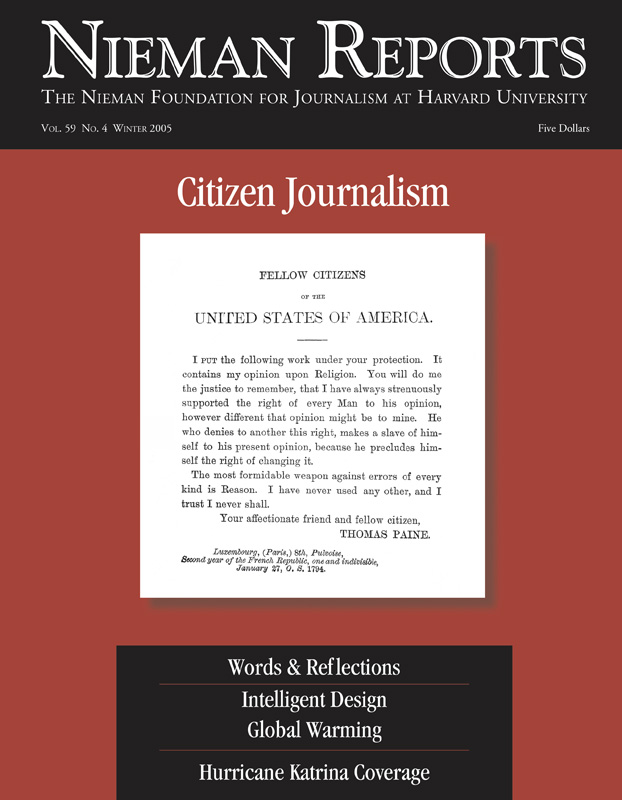We’re all citizens, but not all of us are journalists. And the term “citizen journalism” is one I’ve never cared for. It’s inaccurate.
Journalism requires more than one person and it needs a support structure. It’s about editing, questioning and challenging assumptions. Much of what is put on blogs right now is “opinion.” There are good, thoughtful opinions out there—but they’re often presented as fact. There is some journalism happening in the blogosphere, but not much. It’s mostly meta-journalism—reporting on reporting.
I don’t like the “citizen” part, either. The term is self-congratulatory and, frankly, a little smug. The notion that the bloggers and citizens will rise up and make the mainstream media obsolete is naive. At a recent seminar, the subject was much debated, since an increasing number of news organization Web sites now invite user participation. That part is terrific. What seems less praiseworthy is the apparent lack of understanding of the basic rules of journalism.
A number of those who run these Web sites are thrilled about receiving user content—they’re just not interested in vetting any of it. What surfaced in this seminar was the notion that “if we don’t edit it, they can’t sue,” an assumption based in part on a pair of rulings from the 1990’s. In Kenneth M. Zeran v. AOL, the court held that AOL, as an Internet Service Provider (ISP) could not be held responsible for a defamatory posting on one of its bulletin boards. Zeran was an early test case of the Telecommunications Act of 1996 that says ISP can’t possibly monitor every bit of communication that passes through their space and therefore cannot be held liable. In Blumenthal v. Matt Drudge and America Online, the court refused to hold AOL responsible for content Drudge posted on his site that quoted a source as saying newly named White House Advisor Sidney Blumenthal had abused his wife.
In 1998, Tech Law Journal wrote about the Blumenthal suit: “Section 230 of the massive Telecom Act of 1996 protects interactive computer services from lawsuits based on defamation by information content providers. It provides in part that: ‘No provider or user of an interactive computer service shall be treated as the publisher or speaker of any information provided by another information content provider.’”
Examine more closely the final sentence of that excerpt and ask yourself what constitutes an “information content provider.” It is reasonable to assume not every single person is an information content provider. The Telecom Act’s intent appears to be protecting ISP’s from lawsuits stemming from defamation on Web pages and message boards they don’t control.
News organization’s Web sites are not ISP’s. They are editorially driven, and their content is vetted by professionals. We might want viewers and users to contribute content, but it seems a weak argument to claim that a defamatory letter, for example, which would never be published in a newspaper, could be posted on the paper’s Web site. Yet there was substantial debate over this topic at that citizen media seminar I recently attended. Some participants even took offense to the idea I would look at content without putting it online. One editor of a weekly newspaper wondered aloud, “Who am I to decide what people are interested in?”
You’re the editor, that’s who.
Images, the Web, and Responsibility
At NECN (New England Cable News), we started an experiment in July 2005 inviting our viewers to send in video news. The program is called “Video New England.” We have made it very easy for people to send us video clips from their desktop computers. Anyone who has uploaded a picture to a file-sharing site like Flickr, or to a printing service like Snapfish, can easily send video to our news desk.
At first, the response was slow. We expected that. We also anticipated that we would see a spike in contributions during the first big storm after launch. Sure enough, that happened. We thought it would be a snowstorm that did it, but when New England got hit with major rainstorms and flooding through much of October, rivers overflowed and so did our viewer video contributions.
Most of the videos that reached us were excellent. And by that, I don’t mean “broadcast quality” or even “VHS quality.” Some of the video was quite grainy and even a little on the shaky side, but we didn’t care a bit. For us, “Video New England” offered viewers a valuable source of information. We could show flooding scenes from around the region in ways we simply aren’t staffed to do. We empowered our audience to tell us the story. And they did.
There is an idea, and a good one at that, that ‘news is a conversation.’ But even this phrase often seems to be applied wrongly; a conversation is not 1,000 people shouting at once. Good conversation is two-way, among a few people.
That’s why we call what we do “participatory journalism.” There is an idea, and a good one at that, that “news is a conversation.” But even this phrase often seems to be applied wrongly; a conversation is not 1,000 people shouting at once. Good conversation is two-way, among a few people. If viewers are allowed to post anything they want on the message board I host, it invites all sorts of dangers, not the least of which is a defamation lawsuit.
Another assumption being made by some of the newspaper and TV Web sites is that their organization’s staff will not be held responsible if they simply take down “offensive material.” That’s an interesting choice of words, since “offensive” material is in the eye of the beholder. One site that invited local bands to post their flyers got complaints about a neo-Nazi band posting there. The editor proudly announced to us at the seminar that he had taken down the offending flyer. I asked him if he would take down rap music with violent lyrics, or heavy metal Satan-rock. He wasn’t sure he knew.
Consider this: If a TV station airs a slanderous news report and it is “taken down” the moment it ends (in the sense that it’s done being aired), does that mean the TV station is not liable for its content? Let’s look for a moment at a good theoretical example: Suppose someone can post any picture they want at MyNewspaperName.com. Suppose that picture is a Photoshopped composite, showing a local school teacher’s head on the body of a naked model. The teacher complains, and MyNewspaperName.com takes down the picture. In the intervening time, every student in her class has seen the picture, and some have downloaded it and sent it to their friends. By the end of the day, it’s even appeared on pornographic Web sites.
This teacher isn’t going to try and find the anonymous poster. She will sue MyNewspaperName.com, and it’s my guess a jury will award her a few million dollars. “We took it down” is simply a lousy defense.
One question that keeps popping up in conversations about citizen journalism is, “We can’t be expected to monitor every single post that comes in, can we?” The answer: “Yes.” The contributions must be edited, just as any good news organization would do with their own staffers’ contributions. I wouldn’t put a report on air or online without vetting it, so why would anyone publish content from someone they’d never met without so much as a glance?
Even if it turns out that news organizations cannot be sued for defamatory postings—and I believe the issue will one day be in the courts—I question why they would want to offer this new opportunity. If a news desk cannot monitor and edit material that appears under their banner, it seems their message ought to be, “We can’t decide what news is anymore—why don’t you do it?”
A better model is participatory journalism, in which a news organization works with its audience to have that “conversation” that is news. Our judgment is used to make the final call, but we listen closely to what New Englanders tell us. It’s the New England town hall meeting format, writ large. Town members give us ideas and suggestions, but at the end of the meeting, the moderator—that’s us—decides how to proceed. Everyone is a citizen, everyone contributes, and everyone wins.
Steve Safran is the director of digital media at NECN and managing editor of LostRemote.com.



